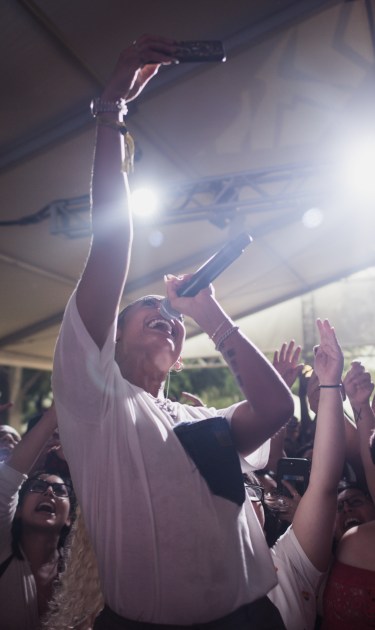Chicago’s music festival Ruido Fest is known for being produced by, and catering to the city’s diverse and ever growing Latinx community. This year’s edition marked the five-year anniversary of the annual, alternative Latin music festival, and it was the fest’s most vigorous attempt at showcasing a more diverse, all-encompassing musical lineup.
The fest’s most evident change was in its location. Previously having taken place the first four years at Adams-Medill Park in Pilsen, the fest upgraded to Union Park right outside of Chicago’s ritzy West Loop. It’s the same park where Pitchfork Music Festival takes place every year, and is on the outskirts of the neighborhood that houses Chicago’s Google headquarters, a Soho House, and dozens of top chef-run restaurants. Logistically, upgrading to Union Park made plenty of sense – it’s in a more central location of the city, and that makes it easier for Latinx atendees from the city’s North, South and West sides to commute to. It’s also a larger park, allowing for more ticket sales, and more attendees. But the decision seemed like a symbolic decision as well. Placing Ruido Fest in a more central, booming part of Chicago almost served as a political statement – showing that Latinxs don’t just belong in their designated, segregated, pockets of Chicago.
Ruido producers also showed more love to local acts this year, far more than in the fest’s previous lineups. While 2 out of the 3 festival days were grey, wet and ultra gloomy (classic, unpredictable Chicago style weather), that didn’t stop the audience from showing up for hometown heroes, like indie rock band Los Gold Fires, DJ collective Sonorama, and the infectious, high energy hip-hop cumbia hybrid group, Quinto Imperio.

Los Gold Fires brought out quite the crowd for being one of the smaller acts within the weekend’s lineup. The Pilsen-based band produce hazy and long-winded (in a good way) alternative rock tracks that effortlessly blended from one song to the next during their set. The group’s aesthetic of subtly hipster, modern, young Latinx men, gives off the vibe of your typical neighborhood rock band — but in this case their music is actually very good. Stylistically their sound echoes the classic rancheros that they were most likely raised on, melding with a modern, 2000s inspired rock sound.

Quinto Imperio – another Chicago-based, family formed cumbia group – brought a high energy set on Saturday. They were one of the few acts all weekend that had the bulk of their crowd dancing throughout the entirety of their performance. Other hometown favorites who showed up and showed out over the weekend included budding bilingual pop singer Tatiana Hazel and Victor!, as well as club scene favorite DJ Chava.
When Ruido first debuted, it’s claim to individuality in a crowded festival scene was that it was a single weekend where one could go see classic Latino acts such as Molotov, Cafe Tacvba, Caifanes and more. It was a direction that was nostalgia-inducing, but extremely and narrowly male-centric. This year, in an attempt for a more modern and diverse lineup, a focus on booking female performers was evident – and they were undoubtedly the most enticing to watch all weekend long.
Acts like Tijuana’s Vanessa Zamora were at a disadvantage with less than ideal time slots (she was competing against Spanish super band Hombres G, performing at the same time), but nevertheless gave her all for the intimate crowd who came to see her belt her 80s inspired, breezy, electro-pop catalogue.

It was impossible to ignore the powerhouse presence of the female talent all weekend long – Tatiana Hazel proved her spot as a budding, bilingual pop production princess (along with bedazzled cactus backdrops), and Girl Ultra had a packed tent of mud-covered fans who still crowded in a vicious Sunday downpour to vibe along to her soulful set. One of the only awkward moments came from Mexican rapper Nina Dioz’s use of faux dreadlocks during her appearance, which could have been deemed offensive by Afro-Latinxs in attendance.
An unexpected hit with fest attendees was the New York based, all women mariachi band Flor De Toloache, whose modern take on mariachi music had people intrigued and wanting to stay for more. (One of the group’s lead singers, Mireya Ramos who coincidentally is cousins with Miguel, easily had the strongest vocal performance of anyone that weekend). Aside from their nearly perfect performance, which included Spanish covers of No Doubt’s “Don’t Speak” and Nirvana’s “Come As You Are,” it was refreshing to see a group composed of top notch women musicians who hailed from all different parts of Latin America (and even Italy). Seeing the crowd’s reaction to performers like Flor, Quinto Imperio, and later, Jarina DeMarco and more, was proof that the fest’s crowds were resonating with a thoughtfully curated, culturally diverse lineup.
If anything, this year’s Ruido Fest proved that expanding from the mainstream bubble of Latinx music is a tactic that not only works, but is necessary in order to provide a better experience for longtime fest-goers and entice new revelers to join in. Just like how Latinx identity is impossible to categorize under one umbrella, neither is our music, and as Ruido Fest continues to grow, hopefully they’ll continue to embrace the various genres and subcultures that make us who we truly are.





